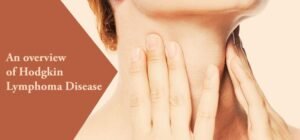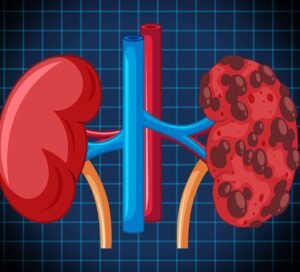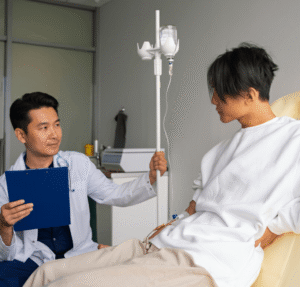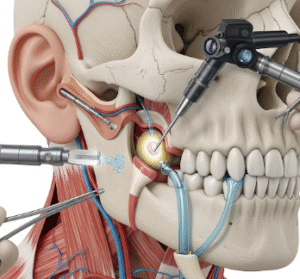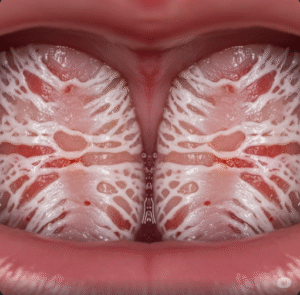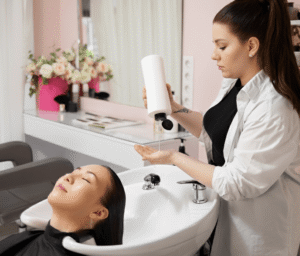Overview
Pityriasis rubra pilaris (PRP) is a rare, chronic skin disorder that causes constant inflammation, scaling, and thickening of the skin. It is characterized by reddish-orange patches, rough bumps around hair follicles, and thickened skin on the palms and soles. PRP can affect people of all ages and has several clinical subtypes. The condition can significantly impact quality of life due to discomfort, appearance, and chronicity, but many cases improve with treatment and time.
What is Pityriasis Rubra Pilaris?
PRP is an inflammatory skin disease of unknown cause that typically presents with red, scaly plaques, follicular hyperkeratosis (small, rough bumps around hair follicles), and palmoplantar keratoderma (thickened skin on the hands and feet). The condition may spread to cover most of the body (erythroderma) in severe cases.
PRP is classified into several types based on age of onset, severity, and prognosis:
- Type I (Classic adult PRP) – the most common form; begins in adulthood and may resolve in 3–5 years
- Type II (Atypical adult PRP) – more persistent, chronic course
- Type III (Classic juvenile PRP) – affects children, often following a similar course to Type I
- Type IV (Circumscribed juvenile PRP) – limited to elbows, knees, and other areas in children
- Type V (Atypical juvenile PRP) – familial and long-lasting
- Type VI – associated with HIV infection
Symptoms
The clinical presentation of PRP can vary, but hallmark symptoms include:
- Reddish-orange scaling patches, often starting on the head or upper torso
- Rough, small bumps around hair follicles (especially on thighs, arms)
- Islands of normal skin (“skip areas”) within affected regions
- Thick, cracked skin on palms and soles
- Itching or burning sensation
- Nail changes (thickening, discoloration, ridges)
- Ectropion (outward turning of the eyelids) in severe cases
- Hair thinning or loss (scalp, eyebrows) in long-standing cases
Causes
The exact cause of PRP is not fully understood. It is believed to involve a malfunction in the immune system and abnormal keratinization (skin cell turnover). Possible contributing factors include:
- Autoimmune dysregulation
- Genetic mutations, particularly in familial cases (CARD14 gene)
- Infections, such as streptococcal infections or HIV
- Reactions to medications or allergens (rare)
- Idiopathic origin – most cases occur without a known cause
Risk Factors
PRP is rare, but certain factors may increase the risk:
- Age – Type I is more common in adults, while Type III and IV occur in children
- Family history – In some juvenile cases, PRP is inherited
- Coexisting autoimmune or inflammatory conditions
- HIV infection – Increases susceptibility to Type VI PRP
- Recent illness or skin trauma – May trigger the onset in some cases
Complications
Without treatment, PRP can lead to multiple complications, including:
- Widespread erythroderma (redness and peeling across the body)
- Secondary bacterial or fungal infections
- Cracked, painful skin on hands and feet, limiting mobility
- Nutritional deficiencies (due to skin protein loss)
- Social withdrawal or depression due to visible disfigurement
- Chronic inflammation and risk of long-term disability in severe cases
Prevention
There is no known way to prevent PRP since most cases occur spontaneously. However, some general recommendations may reduce severity or recurrence:
- Seek early dermatological evaluation for unexplained scaling skin rashes
- Avoid skin irritants and harsh soaps
- Moisturize daily to maintain skin barrier function
- Manage associated autoimmune or infectious conditions
- Follow genetic counseling if there is a family history of PRP
- Regular checkups with dermatologists if previously diagnosed
Treatment Options in Korea
South Korea offers excellent dermatological expertise and advanced treatment options for rare inflammatory skin diseases like PRP. The treatment plan usually focuses on controlling inflammation, reducing scaling, and improving quality of life.
Medical Treatments
- Systemic retinoids: Acitretin or isotretinoin to normalize skin cell turnover
- Immunosuppressants: Methotrexate or cyclosporine for moderate to severe PRP
- Biologic therapies:
- TNF-alpha inhibitors (e.g., adalimumab)
- IL-17 or IL-23 inhibitors (used off-label with promising results)
- Oral vitamin A derivatives: In milder or classic cases
- Antibiotics or antivirals: If an underlying infection is identified (e.g., HIV-related PRP)
Topical Care
- Emollients and moisturizers: To soothe dryness and scaling
- Topical corticosteroids: For localized inflammation
- Coal tar, salicylic acid, or urea creams: To reduce thickened plaques
- Phototherapy: Narrowband UVB or PUVA therapy in specialized centers
Integrated Care in Korea
- Multidisciplinary support including dermatology, immunology, and internal medicine
- Genetic testing available in university hospitals for familial PRP
- Skin biopsy and advanced diagnostics for accurate classification
- Long-term monitoring and psychological support for chronic cases
- English-speaking services at hospitals like Severance Dermatology Center, Samsung Medical Center, and Asan Medical Center for international patients
South Korea’s modern dermatologic infrastructure and personalized approach to chronic skin diseases make it a top destination for patients seeking expert care for rare conditions like PRP.




